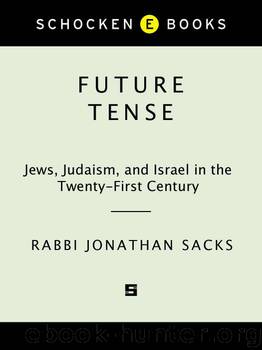Future Tense by Jonathan Sacks

Author:Jonathan Sacks
Format: mobi, epub
ISBN: 9780805242843
Publisher: Knopf Doubleday Publishing Group
Published: 2009-01-11T05:00:00+00:00
Choosing Life
I have tried in this chapter to say what Israel means to me and why I have consistently defended it, sometimes to a hostile British public. No nation is perfect. None can avoid mistakes. Criticism of Israel is legitimate; denial of its right to exist is not. My attachment to it is not political but religious. Israel is the land where Judaism was born, almost four millennia ago, when Abraham and Sarah began their journey. Judaism gave rise in turn to Christianity and Islam, both of which literally or metaphorically claim descent from Abraham and Sarah. Today there are 120 countries in which the majority of the population is Christian.17 There are fifty-seven member states of the Organisation of the Islamic Conference.18 There is only one Jewish state, a tiny country, one-quarter of one per cent of the landmass of the Arab world.
Israel has done extraordinary things. It has absorbed immigrants from 103 countries, speaking 82 languages. It has turned a desolate landscape into a place of forests and fields. It has developed cutting-edge agricultural and medical techniques and created one of the world’s most advanced high-tech economies. It has produced great poets and novelists, artists and sculptors, symphony orchestras, universities and research institutes. It has presided over the rebirth of the great Talmudic academies destroyed in Eastern Europe during the Holocaust. Wherever in the world there is a humanitarian disaster, Israel, if permitted, is one of the first to send aid. It has shared its technologies with other developing countries. Under immense strain, it has sustained democracy, a free press and an independent—some say too independent—judiciary. Had my great-grandfather, or, for that matter, George Eliot, been able to see what it has achieved, they would hardly believe it. In truth, I hardly believe it when I read Jewish history and begin to understand what Jewish life was like when there was no Israel. For me, more than anything else, Israel is living testimony to the power of Moses’ command, ‘Choose life.’
Twenty-six centuries ago, in exile in Babylon, the prophet Ezekiel had the most haunting of all prophetic visions. He saw a valley of dry bones, a heap of skeletons. God asked him, ‘Son of man, can these bones live?’ Ezekiel replied, ‘God, you alone know.’ Then the bones came together, and grew flesh and skin, and began to breathe and live again. Then God said, ‘Son of man, these bones are the whole house of Israel. They say, “Our bones are dried up, our hope is lost [Avdah tikvatenu].” Therefore prophesy and say to them: “This is what the Lord says: My people, I am going to open your graves and bring you up from them; I will bring you back to the land of Israel”’ (Ezek. 37:1–14).
It was this passage that Naftali Herz Imber was alluding to in 1877 when he wrote, in the song that became Israel’s national anthem, Hatikva, the phrase od lo avdah tikvatenu, ‘our hope is not yet lost’. Little could he have
Download
This site does not store any files on its server. We only index and link to content provided by other sites. Please contact the content providers to delete copyright contents if any and email us, we'll remove relevant links or contents immediately.
| Buddhism | Christianity |
| Ethnic & Tribal | General |
| Hinduism | Islam |
| Judaism | New Age, Mythology & Occult |
| Religion, Politics & State |
Cecilia; Or, Memoirs of an Heiress — Volume 1 by Fanny Burney(31336)
Cecilia; Or, Memoirs of an Heiress — Volume 3 by Fanny Burney(30935)
Cecilia; Or, Memoirs of an Heiress — Volume 2 by Fanny Burney(30891)
The Secret History by Donna Tartt(16635)
Sapiens: A Brief History of Humankind by Yuval Noah Harari(13059)
Leonardo da Vinci by Walter Isaacson(11907)
The Radium Girls by Kate Moore(10910)
Sapiens by Yuval Noah Harari(4540)
The Wind in My Hair by Masih Alinejad(4426)
How Democracies Die by Steven Levitsky & Daniel Ziblatt(4401)
Homo Deus: A Brief History of Tomorrow by Yuval Noah Harari(4282)
Endurance: Shackleton's Incredible Voyage by Alfred Lansing(3845)
The Silk Roads by Peter Frankopan(3764)
Man's Search for Meaning by Viktor Frankl(3636)
Millionaire: The Philanderer, Gambler, and Duelist Who Invented Modern Finance by Janet Gleeson(3571)
The Rape of Nanking by Iris Chang(3518)
Hitler in Los Angeles by Steven J. Ross(3439)
The Motorcycle Diaries by Ernesto Che Guevara(3338)
Joan of Arc by Mary Gordon(3260)
